Raising the Steaks: Family Farming is Well Done at Dougherty Beef
Dougherty Farm Fresh Beef in Franklin, Indiana, produces enough freezer beef each year that it could host a burger cookout for the entire city of Terre Haute (population 59,900) with leftovers. As impressive as that is, the Dougherty family prides itself more on quality than quantity, raising grain-fed Black Angus cattle on their 2,000-acre, third-generation family farm.

Returning to Roots
“There’s something special about working a family farm – all these generations have worked it, grown it, improved it,” says Abby Dougherty Nichols, who started in the beef business in 2004 with cousin Zach Dougherty.
Both graduated from Purdue University with agriculture degrees, returning to the farm to combine education with experience. Today they each live within a mile of the family farm.
The cousins’ grandfather, Floyd Dougherty, was born near the current farm, which he purchased in 1961. He farmed his entire life, aside from the four years he served in World War II.
While the farm may have been in the family for half a century, progress hasn’t passed it by. Seed technology helps increase their yield, while an easy-to-navigate website for Dougherty Farm Fresh Beef benefits customers.
High-Quality Care and Diet
Embracing the best of the old with the new is the secret behind Dougherty Beef. They’ve chosen to raise Black Angus cows for their high quality and superior marbling.
“Quality is more [important] than the breed. How the beef is cared for and fed makes a big difference,” Nichols says. “It’s not uncommon to find me out there petting on them.”
Dougherty cattle – those processed for freezer beef – are fed a grain-based diet using corn grown on the farm, which reduces feed costs. But Nichols notes that the main reason their beef is grain-fed as opposed to 100 percent grass-fed is to enhance the quality of the meat for her customers.
“We do our best to raise a premium product, and a corn-fed diet helps to aid in marbling and overall taste of the beef,” she explains. “The cattle also simply love the corn!”
The beef cattle are also fed hay and grass, as well as a soybean-based supplement to add protein to their diet.
Nichols’ “mama cows,” on the other hand, enjoy a diet of hay, grass and, in the winter, corn silage. “This is just where the entire corn plant has been chopped up and fermented in silos,” Nichols says.
The family even planted a special turnip crop last year to extend the grazing season. “After August, it is difficult in Indiana to keep a good quality forage or grass for the cows,” Nichols says, explaining that they need to save the hay to get through winter and early spring.
These cows, Nichols says, need a diet that maintains body weight and supports a healthy pregnancy. “With the cattle going in to freezer beef,” she says, “we are feeding a diet for a premium beef product.”
The Dougherty Difference
The cattle are also raised free of added hormones, implants or antibiotic injections. “We’ve never felt the need to use artificial chemicals in our cows,” Nichols says. “Our cows finish quickly on their own, and working without added hormones makes the meat more tender.”
Dougherty beef comes from younger cows – generally around 16 months – and is also dry aged, which means it hangs in a cooler for two weeks before processing, allowing the enzymes to work on the meat, which also increases tenderness.
“We work hard to make our beef a better product, and our customers appreciate buying locally,” Nichols says. “People have moved away from the farm and have such an interest in getting a connection back to it.”
More About Beef
All Dougherty beef is processed at state-inspected facilities and stored in carefully controlled and inspected freezers to ensure the beef is kept at the right temperature and labeled accurately. Fewer steps to the table means fresher product with fewer opportunities for food safety problems.
Beyond beef, the Dougherty farm raises corn and soybeans, plus a little hay and wheat, and also includes a fertilizer and crop protection retail business. All aspects of the business are family managed by Abby and Zach, as well as Abby’s father, David Dougherty, and Zach’s father, Bruce Dougherty.
“It’s probably every farm person’s dream to have their children take away the lessons they’ve learned on the farm,” says Nichols. “Whatever your passion becomes, the lessons and work ethic grown on the farm will help you to do it better.”
Where’s the Beef?
You can purchase individual cuts, quarters, sides and more by contacting Dougherty Beef at 317-535-8505 or by email at abby@doughertybeef.com. Dougherty Beef processes steers in March, April, September, October and December and encourages you to place your order early to ensure availability. Dougherty Beef can also be found occasionally at the Greenwood Farmers Market.





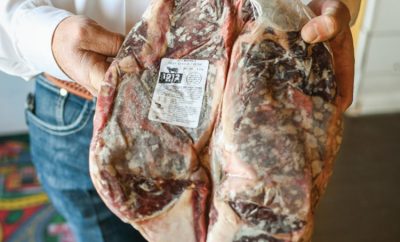
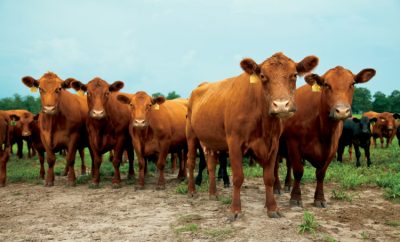

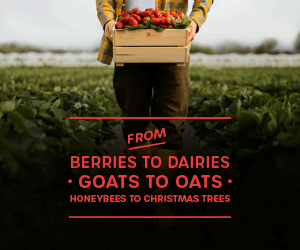

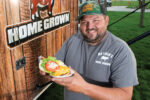



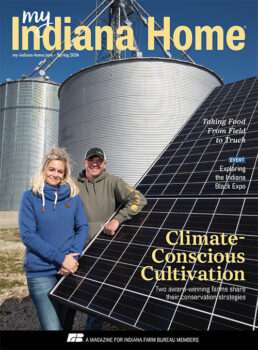 My Indiana Home is produced for Indiana Farm Bureau members. Our mission is to connect you with the food you eat, the Indiana farmers who grow it and a rural lifestyle that is uniquely Hoosier.
My Indiana Home is produced for Indiana Farm Bureau members. Our mission is to connect you with the food you eat, the Indiana farmers who grow it and a rural lifestyle that is uniquely Hoosier.
Marsha Smith
August 3, 2012 at 10:45 pm
Greetings Dougherty Family. Wow! Love it! i taught at Frankin County HS in 1969.. went to IU, worked at Purdue 70-74, grew up in Benton County, where I still own a part of Grandpa’s farm. My dad hauled livestock to Chicago, and he bought a Reserve Grand Champion Hereford at the Benton County Fair. I led it up the loading ramp, petted it, and never could eat any of it! I think I was 8 or 9, and kept that beautiful white face in my mind. But I digress. I read your article, and think you all are just amazing. I am hoping you are doing well with the crazy weather.. If we are ever over that way, I would love to stop and pet your black beauties!
Thanks for the article. I really enjoyed it!